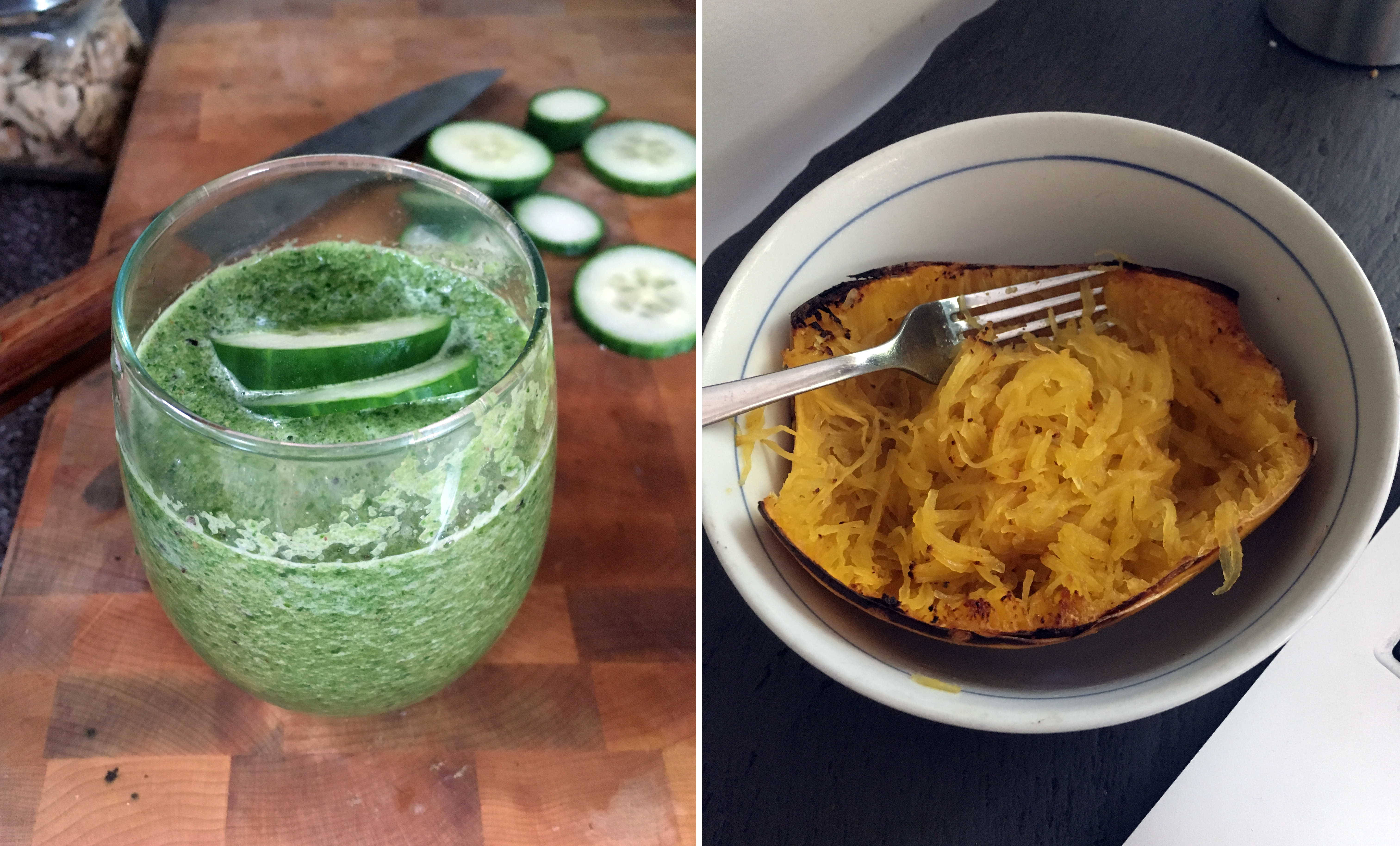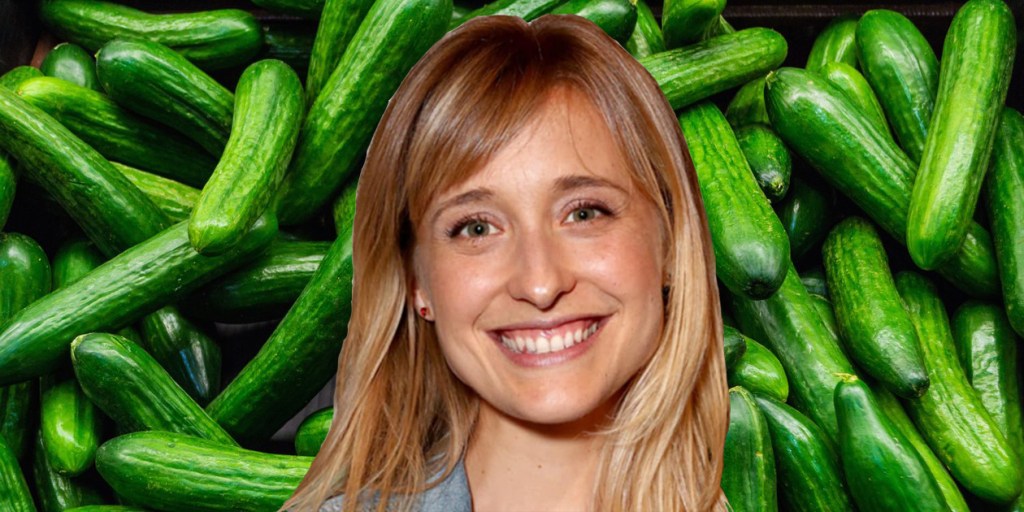Be careful. Sounds dangerous. Why would you fucking do that to yourself?
I mean, I expected these reactions from my mom—whom I absolutely did not tell—but it shook me to hear them from my closest friends and colleagues when I sheepishly announced I would be eating 800 calories or less for the next seven days. Because research. I knew there was a good reason I wanted to try restricting my diet like Allison Mack and the other members of NXIVM’s secret women-branding sorority, but I couldn’t easily articulate it to the people who care about me.
Videos by VICE
When I first met former member Sarah Edmondson, she had described the extremely restrictive diets women in NXIVM’s inner circle adhered to as an apparent way to build character and discipline. Tabloids had called it a twisted form of mind control, but from the inside this was seen as a powerful way to live one’s ethics in a measurable way. The women were required to dutifully record everything they ate, and cheating beyond 800 calories per day was punishable. Nobody in NXIVM circles seemed to call it what it was: starvation.
I think there’s an ease in which women with regular boring human body insecurities can accept that self-denial is an ultimate show of strength. Whatever kind of body you have, it can probably be improved by more exercise and fewer carbs, right? NXIVM took this to its logical extreme, way below the 2000 daily calories recommended by experts. Limiting basic food intake shows you’re not swayed by the base urges of the body—that even hunger has no power over you.
I wanted to understand this mentality as someone who had never counted a calorie or owned a scale in my life. I think by nature I avoid people with self-denying tendencies, opting instead for indulgent company. NXIVM followers were the opposite of indulgent (except perhaps for NXIVM’s jailed leader Keith Raniere, who notoriously loves pizza, to say nothing of his sexual preferences). In Albany, Clare Bronfman paid for a vegetarian chef at a clubhouse called Apropos, where the menu embodied the restraint of Keith’s teachings. Women who ate there would find it easy to keep their meals under 200 calories.
When I began researching this diet, I had absolutely zero sense of what this would do to a person. Followers ate a lot of green vegetables and no meat, which describes the eating habits of a lot of people I know. But the math of staying under 800 per day also meant cutting out most carbs, fats, and dairy, and taking in a lot less protein than recommended. I imagined it wouldn’t feel good, but I was also a bit skeptical about the zombie mind control claims. Because food was such a central battleground for NXIVM ideology, I intuitively knew I couldn’t escape grappling with this kind of “sacrifice” first-hand.
I started calorie-counting my regular meals in preparation. It was admittedly a little unnerving to see all the beer, pizza, and nachos assigned numerical values. But I opted to cut rice or bread a couple times, and started to sense the “reward” that comes with meeting a daily goal. Over lunch I poked my head inside the paleo place across from my office, and for the first time read some extremely detailed nutritional info. I even experimented with the kinds of West Coast health foods that trade in obviously unsatisfying imitation. I resolved that even on a starvation diet, I was not going to eat a goddamn “flax roll.”
On the morning of my first day at 800 calories, with only coffee in my system, I called up a nutritionist who gave me her blunt assessment: “I would never be able to recommend to someone that they follow something this calorically reduced,” Ali Eberhardt, a registered dietitian working with government eating disorder programs since 2011, told me. “It sounds very detrimental, very worrisome.” As if on cue, my stomach started to growl. I had some cucumber and green beans ready to munch on, but they were just out of reach on my kitchen counter, and I didn’t want to interrupt our interview.
Eberhardt told me that 800 calories a day was low enough that basic survival mechanisms would start to kick in. “When someone restricts their carbohydrate intake, that essentially is restricting their glucose, and glucose is the only fuel for our brain,” she said. It would be several hours before my own mental fog officially kicked in, but I told myself I was prepared to operate at less than 100 percent. Things like hormone function, mood stabilization, and general cognitive functioning would be “down regulated” if I continued depriving myself of nutrients long enough. Eberhardt said this is so my body could focus on the absolutely necessary functions—you know, like keeping my heart beating.
I meditated on this as I put my first NXIVM-approved lunch into the oven—a halved spaghetti squash that I would eat with zero-calorie hot sauce mixed in. A former roommate of Allison Mack had told me squash was one of Mack’s favourite ways to feel full—a low-calorie vegetable dressed up as pasta. Apparently she ate so much of it, her palms once turned orange (likely a clinical condition called carotenemia, caused by excess beta-carotene in the blood, according to Eberhardt).

My meal experiments read like vegetable mad libs, because sticking to veggies meant the appearance of fully-portioned meals. I tried blending cucumbers and spinach with ice, lemon and ginger for a breakfast “smoothie” but eventually abandoned this in favour of half a baked sweet potato. I made salads with tomatoes and artichokes, or soups with tomatoes and cucumbers, or I sauteed the artichokes with mushrooms and zucchini. For a dinner I would braise cabbage with carrots, green beans and cauliflower. I baked and seasoned all the varieties of squash because they really were filling, and I straight-up ate sauerkraut out of the jar after reading how few calories were in it. I also counted up to ten nuts as a daily snack.
I tried to keep breakfasts between 80 and 120 calories, lunches between 100 and 250, and dinners under 300. Sometimes I wouldn’t need lunch because I’d mindlessly ate so many carrots or cucumber throughout the day (I found it physically impossible to eat more than 80 calories worth of either at a time). If I magically got as far as 1 PM on less than 200 calories, then I might splurge on a slice of chocolate chip zucchini bread (made with coconut flour at the aforementioned paleo place) in the afternoon.
I didn’t like bringing up my experiment in public, because I knew it elicited immediate concern. By the second day I could see it was affecting my mood—I snapped at a colleague for adding a typo to one of my stories, and complained about a 6 AM text that woke me up. But on the inside, I can admit to feeling this virtuous, almost enlightened sensation. Maybe I was just interpreting the brain fog as a moment of zen, but I thought I might have some secret self-possession others wished for—that I was capable of just about anything.
It wasn’t until the third day that I started to grapple with the social isolation caused by the NXIVM food plan. A friend from Toronto was in town for a few days, and a gang of old pals was planning to meet up for a drink. Aside from alcohol’s obvious calorie problem, NXIVM’s higher ups were hardline teetotalers. New members would learn this the hard way when they brought wine to dinner at president Nancy Salzman’s house. My at-home beer replacement had already become grapefruit-flavoured La Croix (zero calories!) and a drag of my weed vape. As satisfying as this practice was, I knew it wouldn’t fly at a pub.
With my problem-solving brain admittedly compromised, I flaked without even telling my friends. I felt bad about it. I could have at least lied and said I was caught up at work! I was too embarrassed to show up and explain my menu choices (water and salad at a pub??) to a bunch of people who would all take this news in different ways.
At home I started to think about how a young, talented, well-connected actress could start to disconnect from her community in a subtle, creeping way. I’m sure the acting community is more accepting of extreme diets than most, but Allison’s was an ethic and a personal philosophy, too. One she never shut up about. It feels uncomfortable when the people around you don’t share enthusiasm for the one thing you’re excited about—even worse if they make worried faces when you bring it up.
The one friend I felt most comfortable confiding in offered to try the NXIVM diet with me for a day in solidarity. We exchanged gazpacho and zucchini taco recipes and complained to each other via text. “Do you think one of the reasons the cult had this diet was so that the women would bond with each other by talking about calories because they a) literally couldn’t think of anything else and b) could only talk to someone else going through the same nightmare?” she posited. “In other news my dinner was 229 calories.”
Though she was half joking, there was a certain wisdom to her question. While the outside world made me feel judged, she and I could laugh about our struggle together. The next day, we talked about how challenging it would be to wholeheartedly believe in an extreme diet, only to have friends and family try to talk you out of it. “I felt really virtuous yesterday and also like you were the only person I could tell about how virtuous I felt,” my friend texted, already returned to free-drizzling olive oil on everything.
As my (increasingly annoying) diet kicked into day four, my thoughts were spinning in all directions. One moment I was thinking about the culty camaraderie that came with enduring the same challenge, and the next I was worrying about Eberhardt’s more distressing warnings—that long term my hair could fall out, my periods could stop, and my organs could be permanently damaged. I didn’t feel as physically hungry as I thought I should, but on the other hand I could easily slip into fantasy about brownies and McDonalds fries. I thought maybe I was a natural at this, or maybe I was dying inside and I didn’t know it.
At the same time, I didn’t perceive the same “brain fog” I had on day one. It was probably there, I thought, but I couldn’t recall the sensation of a clearly-thinking brain to compare. This is where someone can get locked into a strange and desperate headspace—either collapsing into an increasingly restrictive habit or stumbling onto a binge/purge seesaw. “They’re not able to necessarily always make rational decisions,” Eberhardt told me. “Which is one of the pieces that makes an eating disorder so challenging for loved ones as well—because they see a loved one greatly impacting their health and seemingly unable to make changes which might seem simple.”
By the fifth day I had developed some rationing habits. If I was happy with the taste of something I made, I would be sure to save half or more for a future meal. I liked knowing that I had incremental options ahead of me. I was tired of eating cucumbers and carrots because I couldn’t think of anything else.
When I asked Eberhardt straight up if she thought a diet could be a tool for mind control, she was surprisingly receptive to the idea. “There are definitely cognitive impacts to someone who is being calorie restricted,” she said. “When my clients are able to improve their nutritional intake they’ll say, ‘I felt like I was walking in a fog—I didn’t realize until now that I’m in this place of clarity where I can see and I feel very detached from who that person was’—because you’re essentially in this place of survival.”
I knew that the secret sorority inside NXIVM didn’t think they were in a “place of survival”—quite the opposite, they thought they were fulfilling their dreams. Near the end of my experiment I decided to bust out some old jeans that were a size too small on me. They slid on without hassle, though the top button was still snug. I checked out my butt in the mirror as a sugar rush of endorphins surged through my brain—or was that just lightheadedness from standing? I couldn’t be sure.

By this time my limbs had started to feel heavier than usual. I took my time riding my bike, and waited an extra beat before adding to a conversation. As a test I met friends at a notoriously messy East Vancouver karaoke night, and while it was torturous listening to drunk people howling that one Sheryl Crow and Kid Rock song into a microphone, I didn’t feel out of place in my wobbly, delayed state. I only had to refuse a drink once.
My last day turned out to be my least comfortable and most obsessive. I couldn’t stop thinking about what I’d get to taste when the clock finally ran out. I wanted so badly to join regular society and not to have to explain to anyone else why I was sipping on peppermint tea and possibly tipping over in my seat. I started planning a midnight snack and the next day’s meals in my head.
While it was only seven days, eating like this gave me a taste of the NXIVM identity. Meals undeniably shape our society, and who we eat with naturally becomes our community and support system. When you choose a diet so far outside the norm that you don’t want your own family to look too closely, that’s a wedge that only grows with time and discomfort. It’s easier for someone who believes they’re on a moral high ground to ignore warnings and surround themselves with the people who agree with them.
Do I think I was more suggestible or moody or light headed? Absolutely, and I think the other women who ate this way did too. I found it very difficult to concentrate on anything for more than an hour without my brain circling back to food. But I think it was the meaning and belief they put behind it that ultimately isolated them from the world. Because no amount of nutritional information can argue with moral righteousness.
Sarah Berman is a senior editor at VICE Canada working on a book about the NXIVM sex trafficking trial with Penguin Canada. Follow her on Twitter.
More
From VICE
-

Collage by VICE -

Collage by VICE -

Collage by VICE -

Collage by VICE
